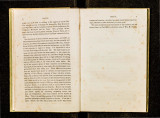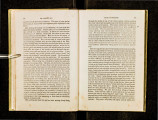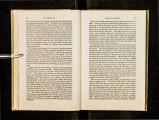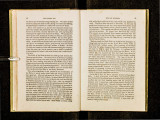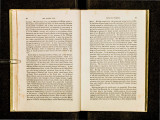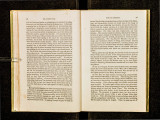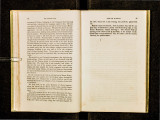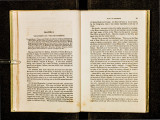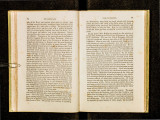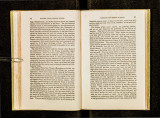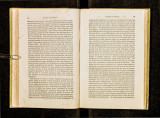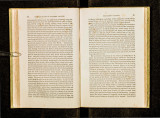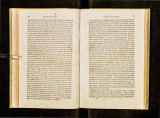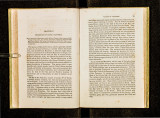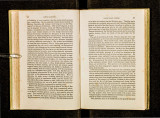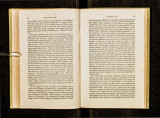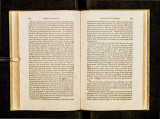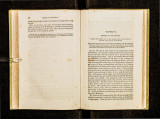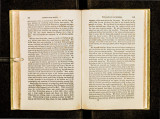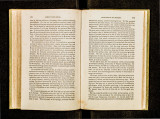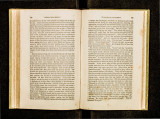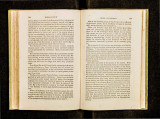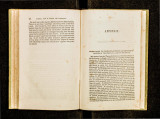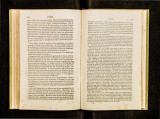| OCR Text |
Show 114 JOUR~EY :fROM OREGON, actor and manners. He advised us to lay Hside our arms, assume a careles5 demeanor, and trust the event to him; assurin~.us, at the sarne tirn r~, that he was confide nt he eoLtld rnuke renee, wtthout ~uy lo:3s of life 01• pi'Operty; b()th of which wet·e of nearly equal Im· pol·tanee to u~, in the situatioll we then we1·e. Th~1·e .was no tillle fot• wm·ds, and we yielded to his judgment, supe-rlOl' m such aff.tirs to ou 1·s, and fulloweu his advice. Tho Indians, about sixty in number, carne yelling. anll !Jeating loudly on a l\ind of a fhum. vVhen within tl1!'ee hundred yards, they separnted; the Chief, with one part~ charged up, on tl te sfltr.e side! .of .the litt:e stream on which we \vere encamped, yelling and flounshtrg then· arms, and thing in the t~t·; while the others, o~ the opposite si?e, with the same kind of mu . .;ic, swept away our nmrna~s. The Chtef, with his party, reined up against out· packs, and formed in a circle around us; except a few, who continued to fly back and foward, w thin eight or ten yards of us, yelling, firing and flourishing their nt·m~. At this instrtt1t a hot headed Southerner, seizing his gun, and crying out th~tt we were betrayed and should sell our lives as dearly as possible, was just in the act of firing on one of these yelling theives, but was prevented, by ~he intervention of some of our party, and the remonstrun.ee of Capt. Grant. Thus they stood around us, half naked, painted in thP. most hidious manner, and with theit· anns ready in theit· hands. The other Indians, having dnven our hot·s-es beyond' the hills, and perfo1·med a war dance. on one of the neighboring summits, at a signal given by those in our camp, came charging down with whoop and yell, and 1 hickened the ranks around us. Out· siluation was uncertain; the Chief aud Capt. Grant, with the Ft·enchrnan, were engaged in an excited parley, the event of which, we did not know. From the great dispari· ty in numbet·s, we were perfectly in the power of ou1· foes, who could ha\'e cru shed us iu an in stant, with a single blow; which any act Ol' expression of ras hness, or wa ut of boldness, would probably have brought about. But the most utr~cting scene which our confused camp pre· sented, was that of lwo little O'il'ls, who, trembling with fear, and 0 ~ in tears, crouched at theit· fathet·'s feet, seeme<.l to implore that pi'O· tection ft·om a pa1·ent which he could not give. To feel one's self in the pnwet· of a mean and miset·able foe, whom he despises, is maddening; and when so sun·nutlded, powerless, and submissive, we could not but d t·eam of vengnance, us we looked about us, and hope to crush, at some sweet future period, those grim h·owning ( Wil'H SOME OF lTS INCIDENTS. 115 wt·etche3. After a long consultation, in whi ch the Set·pent refered to the death of his son, and to the t\VO Sh1>shonea3. (:3nakes.) that had been killed, fol' 00'Bttin "~r the mn.nv. iuj..u t·ie:::, robbel'ie~ ' and insults, which emigl'Unts ft·om the United States had suffered ftorn his p~ople; he agt·ced to con::;ide t· the insult canceled, to return our hot·ses, and withdt·aw pr.~ace <lbly, withuut intel'mpting us or out· pt·opet·ty, upon Capt. Gi'ant pl'omising to give him a gl'een blunlwt, and some tobacco. Ti1ey l~ept theit· faith towards us, but not towards out· pt·opet·ty; taking ad vantage of their proximity, and the disorder, to pilfet· whatever tlJ ey c•mld lay theit· ·hands on. Havia1g re~ained our animals, and paekeJ up, we followed Capt. Gt·atlt, nnd jt>ined hi~ ccvnp in the evening. This cit·cumstAnce happened on the 20th of M<ly. Having .PineJ with Cupt. Grant, we continued to travel with him, until we reached his Fort. At our second encampment on the Bnde River. a Frenchman and hi~ Indian wife came to us, from Fort Bui ...; e. They came expressly to meet Capt. Grunt. having, probably, Sl>me message. 'fhe Frenchman toltl u . .,, thut the village neat· the mnu 1h of the ri~er, exaspet·ated againsi. the white people, on account of the dealh or" their friehds, would hardly allow him to pass. They debated among themselves whether they should not kill him; but by the intervention of his wife, who was of thei t' tt·i be, and related to some of the lndian.3 of the village, and as he was not an Arnel'i- '· Chn, they concluded to spare him. We were aware~ that if we met any of these Indians, they would nc,t be well disposed towurds us; but thi~ timely infiJt'llHltion put U:'l mot·e on ou1· guard. On the 30Lh nf May, we ct·ns_-;~d the Bmle Rivet·, at the village of the unft·iendly Indians. The women nnd childl'en had fled from thoi&· huts, as soon us they became apprised of ou1· appi'Oach; and he&·e and there on the hills ai'Ounq, we could see them c-ouched amon(J' the sa(J'e. They knew that we were Americans, and tho 0 0 men, standing around in gi'Oups, regut·ded us with angry, and sullen countenances. But under the cil'cumstances, they were more in fear than we we1·e, aud appeat·ed without thei1· at~ms. As we p.assed, the relations of the two that had been killed, set up a hO\:d. of lamentation, which they continued as fat· as we could hear. '!'hat evening, we pitched our cnmps. on the bank o.f Snake Rive•·, three miles distant from the village. Many of the Diggers cnme iuto our encampment, ~nd appeared to be anxious to obtai11 aome oppo1·Lunity of reven~e.. Soul~. of the.m wer.e ~axry ing thci~ |







